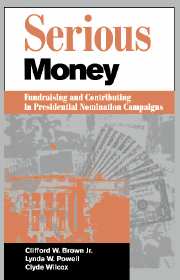Book contents
- Frontmatter
- Contents
- List of figures and tables
- Acknowledgments
- 1 Introduction
- 2 The regulatory environment
- 3 The contributor pool
- 4 Mobilizing the pool: Methods of soliciting campaign funds
- 5 Candidate resources
- 6 Recruiting contributors and solicitors: Candidate and individual decisions
- 7 Conclusion
- Appendix I The 1988 and 1992 presidential nomination surveys
- Appendix II 1988 and 1992 survey items used in the analysis
- Notes
- Bibliography
- Index
5 - Candidate resources
Published online by Cambridge University Press: 27 August 2009
- Frontmatter
- Contents
- List of figures and tables
- Acknowledgments
- 1 Introduction
- 2 The regulatory environment
- 3 The contributor pool
- 4 Mobilizing the pool: Methods of soliciting campaign funds
- 5 Candidate resources
- 6 Recruiting contributors and solicitors: Candidate and individual decisions
- 7 Conclusion
- Appendix I The 1988 and 1992 presidential nomination surveys
- Appendix II 1988 and 1992 survey items used in the analysis
- Notes
- Bibliography
- Index
Summary
All serious presidential nomination campaigns must carefully assess the resources available to them that can be used to build a financial base. Although each candidate has a unique set of resources, there are five major types that were important in both 1988 and 1992, and will probably remain so in the future. These consist of having a strong home-state constituency; possessing strong ties to national party activists; exercising positions of congressional leadership or having access to the national legislative agenda; sharing ethnic, religious, or other types of social identities with major groups of potential donors; and being well-placed on the ideological spectrum. Each of these resources enables a candidate to tap into the pool of contributors and mobilize an important segment of it. Thus some candidates can take advantage of the opportunities provided by current or former political office, others build on organizational and individual relationships they have developed over the years, and still others exploit common ties of ideology and social identity with their contributors.
The presidential candidate resembles the interest-group entrepreneur of Robert Salisbury's (1969) formulation: he or she must assemble a set of “benefits” that will attract enough contributors to fund the campaign. These solidary, purposive, and material motives activate different sets of contributors and are more or less useful to different types of candidates. Like an interest-group entrepreneur, the candidate must build an organization to distribute these benefits and to attract members (contributors).
In the previous chapter, we demonstrated that there is a connection between the benefits that contributors seek and the methods that candidates use to solicit them.
- Type
- Chapter
- Information
- Serious MoneyFundraising and Contributing in Presidential Nomination Campaigns, pp. 69 - 113Publisher: Cambridge University PressPrint publication year: 1995



